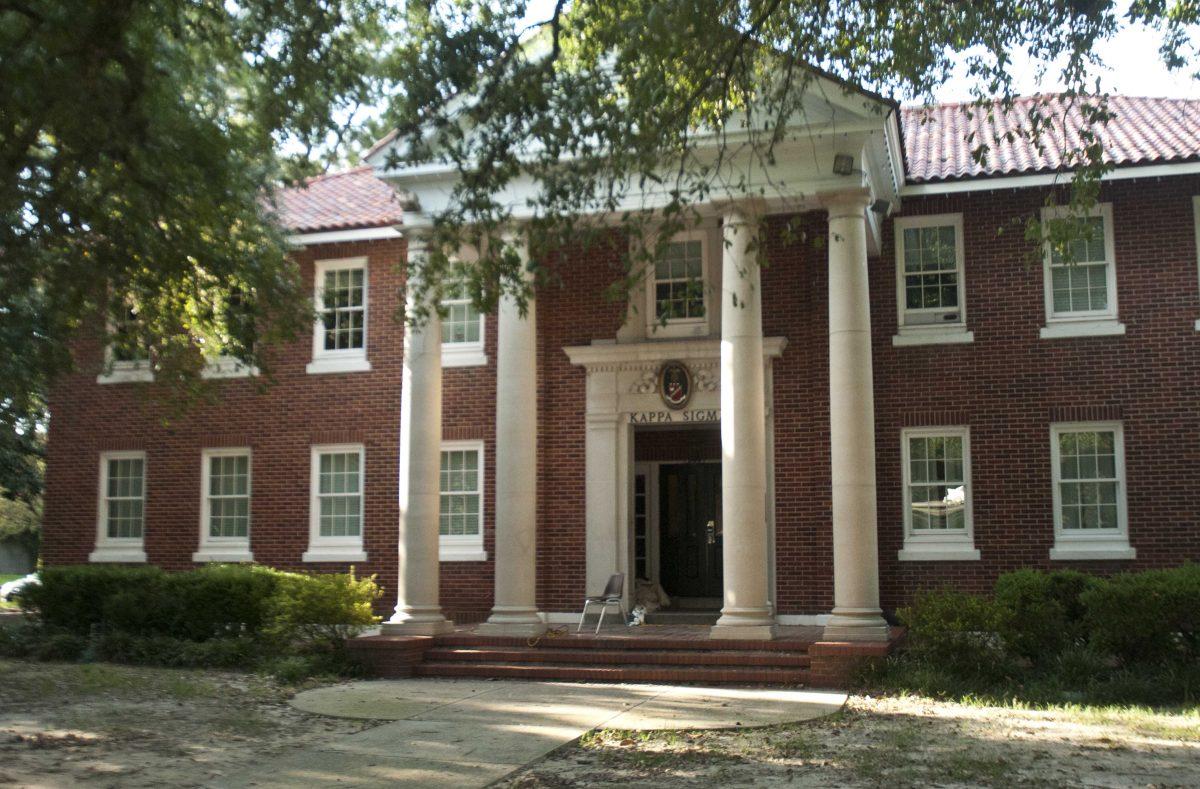Max Gruver reported to the LSU Phi Delta Theta house for “Bible Study” on Sept. 13, 2017. It was his 29th day of being a college student. It would also be his last.
Gruver, a native of Roswell, GA, was pledging the Phi Delta Theta fraternity. His mother, Rae Ann Gruver, said in a court proceeding in September 2018 that Max was excited about potentially joining the fraternity.
“He was very excited when he chose Phi Delt and they chose him,” Rae Ann said.
Around 18 to 20 pledges arrived the fraternity house for “Bible Study.” Their phones were all taken by a fraternity member, and were given lemonade to chase alcohol, according to LSUPD arrest reports.
Pledges told LSUPD the most aggressive members during the event were Matthew Naquin, Ryan Isto and Sean-Paul Gott. The pledges were told to line up in a hallway with their noses and toes against a wall. Gott threw mustard and hot sauce at them while strobe lights flashed and loud music played.
Several pledges said Naquin yelled, “Are you ready for ‘Bible Study’?” He also said “Y’all better do well. I’m already f*cked up,” the reports said.
Members forced Max and the other pledges to drink Diesel, a 190-proof liquor, according to the reports. Several other active members repeatedly warned Naquin he was being too aggressive, but he would not stop.
Several pledges told LSUPD they thought Naquin did not like Max, and yelled at him more than the other pledges. One said Naquin told him he wanted to “cut” Max from the pledge process.
Pledges were told to recite the Greek alphabet. One pledge said Max kept reciting incorrectly, and Naquin kept forcing him to drink the Diesel. One pledge said he was forced to take 10-12 pulls, while the other pledges only took three to four.
There were security cameras in the fraternity house, but they were turned off during “Bible Study.”
When the fraternity members recognized Max was highly intoxicated shortly after midnight, they laid him on a couch in the fraternity house. He was left alone until 9 a.m. the next day.
Fraternity members called pledges to the house when they discovered Max was unresponsive. They forced two pledges to drive him to a hospital, but told them to lie that Max was found unconscious in his dorm room, not the fraternity house.
Max Gruver was taken to Our Lady Of The lake Regional Medical Center, where he was pronounced dead.
LSU President F. King Alexander held a press conference the afternoon of Sept. 14, where he announced Max’s death along with the decision to suspend all Greek Life activities. Alexander confirmed alcohol was involved in Max’s death, and hazing was suspected.
“We at the LSU community are grieving today. The death of Maxwell Gruver was tragic and untimely,” Alexander said. “As we have continually warned over and over again, hazing is dangerous, irresponsible and unacceptable. It will not be tolerated at LSU.”
The same afternoon, the national Phi Delta Theta organization suspended the LSU chapter, and launched an investigation into the incident.
East Baton Rouge Parish Coroner Beau Clark performed an autopsy the next day, where he found a highly-elevated blood alcohol level and the presence of THC in Max’s body. The full results of the autopsy were announced four weeks later, which showed Max had a blood alcohol content of .495.
Four days after Max’s death, the national Phil Delta Organization announced it a statement they would remove the charter for the LSU chapter. Preliminary findings of the investigation showed the chapter violated the Fraternity’s alcohol-free housing policy.
Later that day, the University announced it would hold a “Week of Reflection For Maxwell Gruver.” The week following Max’s death coincidentally was National Hazing Prevention Week, which the University was already planning events for.
A memorial mass was held for Max at Christ the King Catholic Church Monday night, and LSU Student Government held a Rally Against Hazing that Thursday. The statement also encouraged students to schedule appointments with LSU Mental Health counselors if they needed.
Greek Life leaders and Student Advocacy and Accountability representatives held a 4:30 p.m. meeting Sept. 18 in light of recent hazing allegations. In this meeting, attendees were given updates on how the University’s investigation is progressing, and specific guidelines for the “Week of Reflection” Alexander put into place.
The Interfraternity Council held a mandatory educational meeting for all fraternity members to attend, wherein Jud Horras, the president and CEO of the North-American Interfraternity Conference, asked fraternity members reflect on their experiences and make good decisions to define how fraternities are viewed.
The guidelines indicate no new member education may take place during the week, including, but not limited to, service projects, study hours or study groups, uniformed attire, pinning or initiation ceremonies. Further, no chapter would be allowed to host organized tailgates before the football game against Syracuse the following Saturday.
Dean of Students Mari Fuentes-Martin said the purpose of the “Week of Reflection” was not to make Greek members feel as if their privileges were being revoked, but to take time to reflect and heal.
“[There are] people who feel their privileges are being taken away,” Fuentes-Martin said. “That’s not what we’re here for, but at the end of the day it’s something we [as administrators] are responsible for when something this serious does happen. We are thinking for the entire community.”
The University announced some special exceptions to the suspension on Sept. 21, including philanthropies and donations in the wake of Hurricane Harvey.
Later that night, LSU Director of Greek Life Angela Guillory sent a memo to Greek chapter presidents and advisers that some Greek Life activities would resume Sunday, Sept. 24.
Greek Life activities were slowly reinstated over the course of the next three weeks.
With the reinstatement of Greek tailgates came new, stricter policies for all student organizations tailgates. Tailgates were prohibited from having common source drink containers, glass containers, tablecloths, furniture, stages or other structures, vehicles of any kind, tent walls, drapes or stakes to anchor tents. Each organization was also assigned a 30 x 30 foot area they could not move from. Each tailgate was also responsible for cleaning up the tailgate area before the beginning of the game.
On Sept. 29, Alexander announced he was creating a Task Force on Greek Life to examine policies and create potential solutions for LSU Greek Life. Among the task force members were LSU Executive Vice President and CFO Dan Layzell, then-LSU Student Government president Jason Badeaux, LSU Faculty Senate president Kenneth McMillin, LSU Dean of Students Mari Fuentes-Martin and the presidents of the Interfraternity Council, National Panhellinic Council and Panhellinic Council.
On Oct. 4, The Daily Reveille published a story detailing how Phi Delta Theta had been placed on interim suspension in November 2016 after The Office of Greek Life received hazing allegations. The chapter was reinstated on Dec. 21, 2016, a little more than a month after being suspended.
The complaints said pledges were being called to deliver food to active members and pick them up from bars at 3 a.m. One also described out of control behavior at the fraternity’s tailgate before an October 2016 football game, where the complainant said she saw the boys vomiting, passing out and snorting cocaine.
On Oct. 11, LSUPD released arrest warrants for Naquin, Isto and Gott, along with active members Zachary Castillo, Sean Pennison, Hudson Kirkpatrick, Elliott Eaton, Nicholas Taulli, Zachary Hall and former student and fraternity member Patrick Forde. All 10 turned themselves in to LSUPD and were arrested on hazing charges, while Naquin received an additional charge of negligent homicide.
Naquin was released on a $10,000 bail, while the rest posted $5,000.
LSUPD’s investigation into “Bible Study” showed evidence Max was targeted by Naquin, Isto and Gott during the event.
On Oct. 16, the Task Force on Greek Life held their first meeting. Alexander emphasized how the task force was a chance for the University to be a model for other schools on how to punish hazing. He also made clear there would be no “return to normalcy” for Greek Life at the University, and the task force’s new policies would signify a new era for fraternities and sororities.
Alexander sent a letter to Greek leaders on Oct. 19 announcing alcohol would be prohibited at all on-campus Greek Life events. Events with alcohol had been reinstated on Oct. 12, but Alexander said in his letter the conversations he had with people involved in Greek life changed his mind.
“I ask again that we work together in order to eradicate this dangerous undercurrent of behavior,” Alexander said in the letter. “Commit to change for the better. If your organization is already a standard-bearer, take this time to help your peers move toward that same threshold. If you know of troubling, potentially hazardous behavior within your house, your chapter, or other student organizations, I ask that you report it now. Do it for yourselves. Do it for your friends. Do it for Max and the Gruver family.”
As the task force continued to hold meetings into the Spring 2018 semester, LSU IFC announced it would suspend the addition of new members and new member programs while waiting for the task force to make its final recommendations.
The task force presented its final 28 recommendations on Feb. 21, and all were approved by Alexander one week later.
Changes made included the moving of tailgates to chapter houses, the banning of common-source alcohol on chapter premises and at registered off-campus social events, the creation of a web portal disclosing fraternity information and discipline within the past five years, the University’s power to “spot-check” any Greek event and a revised hazing policy.
The Gruver family released a statement criticizing the task force’s recommendations, calling them “disgraceful” and an insult to Max’s memory.
“The report epitomizes what happens when task forces like these are comprised of members with vested interests in perpetuating the current, failed Greek Life system,” the family said in the statement. “[The report] proffers no real meaningful changes to Greek Life that would have prevented the death of our son, any of the other injuries, or sexual assaults that have plagued LSU’s fraternities.”
A grand jury indicted Naquin, Isto, gott and Forde on March 15. East Baton Rouge Parish District Attorney Hillar Moore’s office declined to press charges against Pennison, and the grand jury decided to not indict Taulli. The jury pretermitted hazing charges for Castillo, Kirkpatrick, Hall and Eaton, which means they can be indicted in the future if new evidence comes to light. The jury pretermitted charges of negligent homicide against Isto, charges of obstruction of justice against Castillo and charges of negligent homicide and obstruction of justice against Forde.
On May 31, Gov. John Bel Edwards signed “The Max Gruver Act” into law, increasing hazing penalties in Louisiana and making a hazing charge a felony. Under the Max Gruver Act, people who take part in hazing activities that result in death when the victim’s blood alcohol level is at least .30 would face up to five years in prison and fines of up to $10,000. Prior to Max’s death, a hazing charge was a misdemeanor resulting in a fine up to $100 and 10-30 days in jail.
Hazing events that do not lead to death would be subject to fines of up to $1,000 and six months in prison.
“I think having it in Max’s name — of course it means a lot to our family — but I think it’s gonna speak to the young adults,” Stephen Gruver said. “It’ll resonate more with them since it’s in Max’s name.”
On Aug. 16, the Gruver family filed a federal lawsuit against LSU, the national and local Phi Delta Theta chapters, the company that owns the fraternity house and all of the former fraternity members whose hazing charges were not dropped.
The complaint, filed by Gruver’s parents, Stephen and Rae Ann Gruver, alleges the University and Phi Delta Theta were aware of hazing and binge drinking within Greek organizations and neglected to take the proper measures that could have prevented Maxwell’s death. The complaint says the University treated alleged hazing in sororities with harsh punishments, but did little to combat responses to hazing in fraternities, according to the release.
“LSU’s policy and practice meant that a sorority accused of hazing its pledges by making them sing songs and do sit-ups and putting whipped cream, syrup and eggs in their hair was given “Total Probation” by LSU – the most severe sanction LSU can impose, short of rescinding its recognition of the sorority,” the Gruvers said in a news release announcing the lawsuit.” While Phi Delt’s chapter, which admitted to hazing in 2016, was only placed on interim suspension for a month.”









